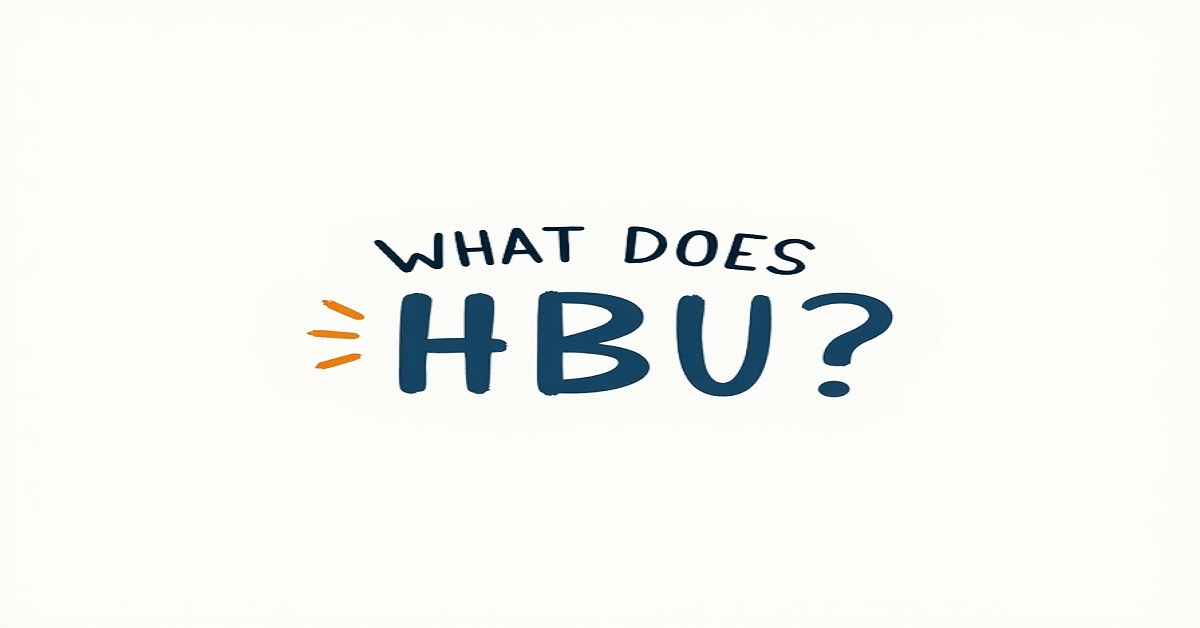Let’s be real for a second: if you’re a parent, there’s a pretty good chance that you’ve found yourself in one of those situations where your teen or young adult says something, and you just nod along like you have any idea what they’re talking about. It’s okay, you’re not alone! Between abbreviations, emojis, and phrases that seem to pop up out of nowhere, keeping up with teen slang can feel like you’re trying to decode hieroglyphics.So, today we’re diving into one of those slang terms that has probably come up in conversation: HBU.
But fear not, we’re not here to throw a bunch of confusing lingo at you—quite the opposite! We’re going to break down what HBU means, how to use it, and why it’s something you might want to start slipping into your own conversations. Ready? Let’s decode this!
What Does HBU Mean?
HBU is short for “How about you?” It’s one of those simple yet powerful abbreviations that teens and young adults love to use in casual conversations, particularly in text messages and online chats. It’s like the digital version of asking someone, “What’s going on with you?” or “What are your thoughts on this?”
Imagine you’re texting your teenager about their day and you ask, “How was school today?” They might reply, “Good, just a lot of homework. HBU?” That’s their way of flipping the conversation back to you, asking, “How about you?”—in other words, “How’s your day going?” or “What have you been up to?”
It’s the conversational equivalent of passing the baton in a relay race. You ask a question, they respond, and then they toss the question back in your direction, giving you a chance to share your own story or thoughts. It’s casual, quick, and a great way to keep the conversation flowing without getting bogged down in a lot of formalities.
Why Do Teens Love Using HBU?
You might be wondering, “Why not just say ‘How about you’?” Great question! Teens and young adults often embrace shorthand and abbreviations because they want to communicate quickly and efficiently—especially in the fast-paced world of texting, where every second counts. Plus, using slang like HBU just sounds cooler. It’s part of the teen culture—think of it as their own secret language that keeps things fresh and fun.
Teens often use these abbreviations to feel like they’re part of an in-the-know group. It’s not just about saving time—it’s about being “with it.” So, when your teen drops an HBU into a conversation, it’s their way of showing they’re up-to-date with the latest trends.
How Do You Use HBU?
Now that you know what HBU stands for, the next question is, “How do I use it?” Here’s the thing: HBU is super flexible. It works in a variety of situations, and it’s all about creating a natural flow in your conversations. Let’s explore a few scenarios where you can slip this into your chats.
1. The Casual Check-In
You’ve been chatting with your teen about their day—school, friends, the usual. To keep the conversation going, toss in a casual HBU:
You: “How was your chemistry test?”
Teen: “It went okay. I think I did well. HBU?”
You: “Oh, you know, same old. Just trying to finish up work. HBU with the rest of your homework?”
It’s just a chill way to turn the conversation back toward them and show you’re interested in their day.
2. The “Me Too!” Moment
Ever hear something that’s super relatable and you just want to share? That’s where HBU comes in handy. It allows you to express a shared experience in a super casual way:
Teen: “I’m so tired after this week’s classes.”
You: “I feel that! This week has been a grind. HBU—are you just as tired as me?”
Teen: “Definitely. Can’t wait for the weekend.”
See? It’s like giving your teen the chance to show that they’re not alone in their exhaustion!
3. The Social Media Vibe
Now, teens love their social media, and HBU is often used when they’re talking to friends or even responding to a post. Imagine your teen sharing an Insta story or posting something on Snapchat:
Teen’s post: “Chillin’ at home, catching up on some Netflix.
You comment: “That sounds awesome! HBU, what are you watching?”
It’s a quick, friendly way to keep the convo moving without getting too deep. Plus, it’s casual enough for social media to feel like it’s not a formal interview.
Why Should Parents Care About HBU?
Here’s the million-dollar question: Why should parents even bother learning slang like HBU? Well, if you’re hoping to connect with your teen in a way that feels natural and modern, understanding their language is key. When you know what they’re saying (and when to use it yourself!), you might find that your conversations flow a little easier. Plus, it can be a fun way to bond over shared moments in everyday life.
Breaking Down Some Common Misconceptions
Some parents might worry that by using slang, they’re trying to “be cool” or “fit in” with their kids. And hey, there’s nothing wrong with trying to relate to your teen, but using slang isn’t about pretending to be something you’re not. It’s simply about being engaged in the world your kid is navigating.
Let’s clear up a few common misconceptions about slang like HBU:
“I’ll Look Ridiculous if I Use It”
Not at all! If anything, using HBU (or any slang) will probably make your teen laugh or feel like you’re really trying to be part of their world. It’s a great conversation starter, and they’ll likely appreciate the effort. Just don’t overdo it—using slang here and there is cool, but peppering every sentence with abbreviations might make things a little awkward.
“I’m Too Old to Use Slang”
There’s no age limit on using slang! Seriously. The more you communicate with your teen in a way that feels genuine and fun, the better. Slang is simply a reflection of the times, so if you want to connect, using it sparingly can be a great way to make your interactions feel more current.
Fun Examples of HBU in Action
Still unsure of how to incorporate HBU into your conversations? Here are some playful, relatable examples to get you started:
Scenario 1: The After-School Report
You: “So, how was your day at school?”
Teen: “It was fine, just really long. HBU, how was your day?”
You: “Same old, just busy with work. Can’t wait to relax for a bit.”
Simple, but effective!
Scenario 2: The Weekend Plans
You: “Got any exciting plans this weekend?”
Teen: “I’m just hanging out with friends. HBU?”
You: “Same here, probably going to watch some movies. What’s your plan for the night?”
It’s just a natural way to keep the conversation going without sounding too stiff.
In Conclusion: Embrace the Slang, It’s All About Connection!
There you have it—HBU is just one of those slang terms that keeps things casual, fun, and fresh. It’s a way to show you care, flip the conversation back on your teen, and keep up with their language. Whether you’re texting, chatting on social media, or just checking in, using HBU can make your interactions feel a little more connected to the teen world.
So next time your teen asks you about your day, don’t hesitate—throw a little HBU into the mix and watch them smile. Who knows, it might just make you the coolest parent on the block.
Now it’s your turn—do you have any slang terms that you’ve learned from your teens? Or maybe you’ve got your own take on how to keep the conversation flowing with your kids. Share your thoughts with us—we’d love to hear what’s working for you!
FAQs About HBU: What Parents Need to Know
1. What does HBU mean?
HBU stands for “How about you?” It’s a shorthand used in casual conversations, especially in texting or social media, to ask someone about their thoughts, feelings, or experiences after they’ve shared theirs. It’s a way to keep the conversation flowing and show interest in the other person.
2. How do I use HBU in a conversation?
Using HBU is simple! After someone shares something with you, you can respond with HBU to ask them about their own experiences or thoughts. For example:
- Teen: “I just finished a big project today.”
- You: “That’s great! HBU, how’s your week been going?”
It’s a great way to turn the conversation back to them and keep things light and natural.
3. Why do teens use HBU?
Teens use HBU because it’s quick, efficient, and part of the way they communicate with their peers. It saves time and makes conversations feel more relaxed. It’s also a way to stay in-the-know with their social group and keep things fresh.
4. Can parents use HBU too?
Yes! Parents can absolutely use HBU in their conversations. It’s a great way to connect with your teen in a more casual and relatable manner. Don’t worry about “trying too hard” — just use it naturally, and it can help bridge the communication gap between you and your teen.
5. Is using HBU a good way to bond with my teen?
Definitely! When you use slang like HBU, it shows that you’re engaged with your teen’s world and language. It can make your conversations feel more relaxed and modern, helping you bond over everyday moments. Just make sure not to overdo it — a little slang here and there is perfect.
6. What should I avoid when using HBU?
While it’s totally okay to use HBU, don’t force it into every conversation or overuse it. Teens can usually tell if you’re trying too hard to “fit in.” Use it naturally and sparingly for the best effect, and remember it’s all about keeping the conversation comfortable and fun.
7. Are there other slang terms I should know as a parent?
Absolutely! Teens have a whole arsenal of slang terms they love to use. A few popular ones include:
- SMH – Shaking my head (used to express disbelief or frustration).
- BFF – Best friends forever.
- FOMO – Fear of missing out.
- LOL – Laugh out loud. You don’t need to become a walking dictionary of teen slang, but understanding a few terms can help you stay in the loop!
8. What does HBU tell me about my teen’s social life?
When your teen uses HBU, it shows that they value the give-and-take of a conversation. It’s an indicator that they care about your thoughts or feelings, and they want to keep the dialogue open. It’s also a sign that they’re comfortable with you enough to be informal and relatable. It’s a win-win for both of you!
9. Should I use HBU with other adults or just my kids?
HBU is really a more casual term used between friends, family, and sometimes peers in informal settings. While it’s perfectly fine to use it with your kids, it’s not something you’d likely see in a professional or more formal setting. Stick to it for family and close friends unless you know the person is comfortable with that kind of slang.
10. What if I’m unsure about how to use HBU?
If you’re not sure when or how to use HBU, just listen to how your teen or their friends use it in conversation. If you’re ever unsure, it’s always fine to ask them what it means or how they use it. Teens usually love explaining their slang, and it could spark a fun conversation about how language evolves!

Tony James is a passionate wordsmith and the creative force behind Winky Hive. With a knack for uncovering the stories behind slang and weaving emotions into poetry, Tony brings a unique voice to every piece he writes. A lifelong lover of language, he thrives on exploring how words evolve, connect, and inspire.
When he’s not penning articles or crafting verses, Tony enjoys diving into cultural trends, reading classic poetry, and discovering hidden gems in modern expressions. His mission? To make Winky Hive a haven for those who love the art of language in all its vibrant forms.









